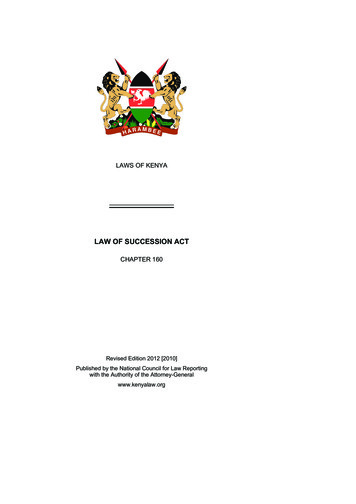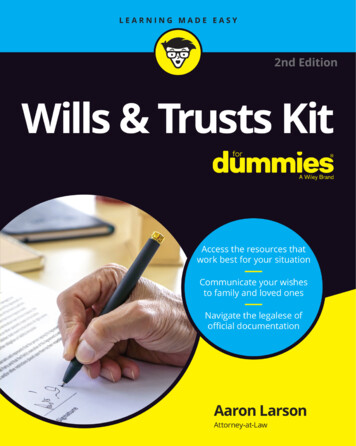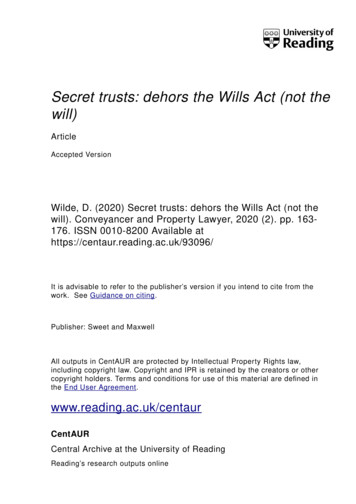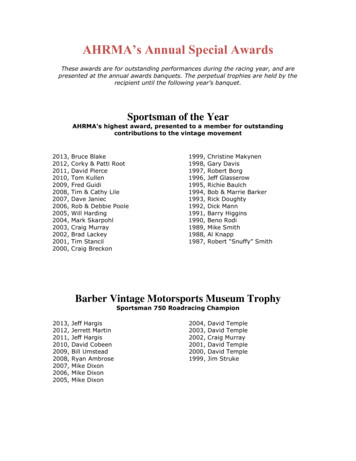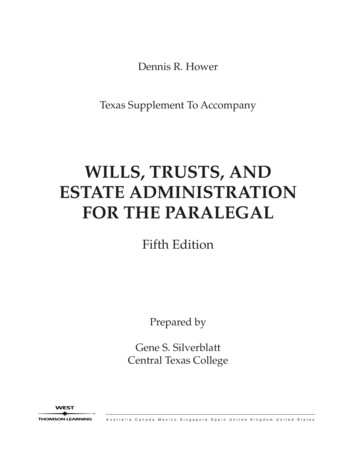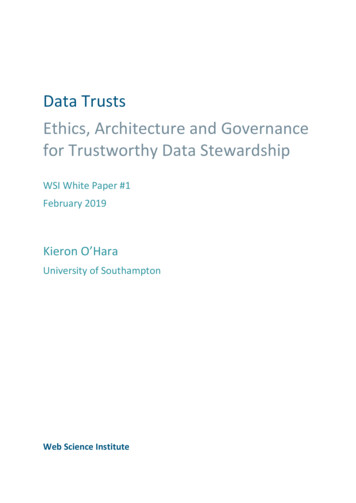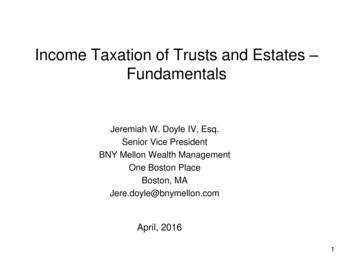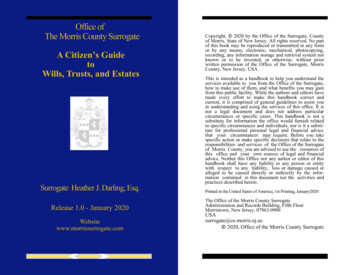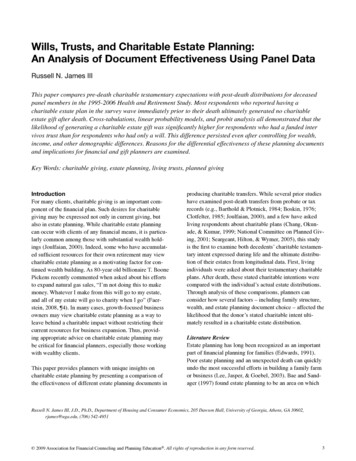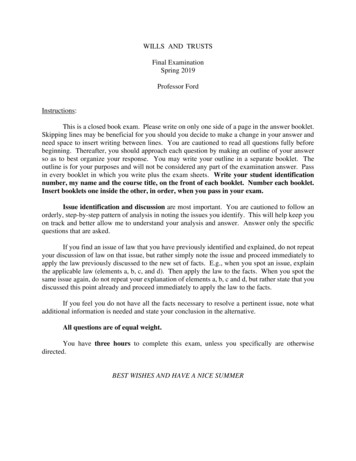
Transcription
WILLS AND TRUSTSFinal ExaminationSpring 2019Professor FordInstructions:This is a closed book exam. Please write on only one side of a page in the answer booklet.Skipping lines may be beneficial for you should you decide to make a change in your answer andneed space to insert writing between lines. You are cautioned to read all questions fully beforebeginning. Thereafter, you should approach each question by making an outline of your answerso as to best organize your response. You may write your outline in a separate booklet. Theoutline is for your purposes and will not be considered any part of the examination answer. Passin every booklet in which you write plus the exam sheets. Write your student identificationnumber, my name and the course title, on the front of each booklet. Number each booklet.Insert booklets one inside the other, in order, when you pass in your exam.Issue identification and discussion are most important. You are cautioned to follow anorderly, step-by-step pattern of analysis in noting the issues you identify. This will help keep youon track and better allow me to understand your analysis and answer. Answer only the specificquestions that are asked.If you find an issue of law that you have previously identified and explained, do not repeatyour discussion of law on that issue, but rather simply note the issue and proceed immediately toapply the law previously discussed to the new set of facts. E.g., when you spot an issue, explainthe applicable law (elements a, b, c, and d). Then apply the law to the facts. When you spot thesame issue again, do not repeat your explanation of elements a, b, c and d, but rather state that youdiscussed this point already and proceed immediately to apply the law to the facts.If you feel you do not have all the facts necessary to resolve a pertinent issue, note whatadditional information is needed and state your conclusion in the alternative.All questions are of equal weight.You have three hours to complete this exam, unless you specifically are otherwisedirected.BEST WISHES AND HAVE A NICE SUMMER
QUESTION 1Helen has always been a resident of Massachusetts. She executed a valid last will in 2015. Underthat valid will, she left her home to her son, Charles, a Bridgewater Savings bank account to herdaughter, Alice, the sum of 120,000 to her daughter, Betty, and the sum of 5,000 to each of hergrandchildren and great-grandchildren. In 2018, Helen made handwritten changes on her 2015will. She left alone the provisions regarding the house to Charles and the 120,000 to Betty. Shecrossed out the words “Bridgewater Savings” and its account number, and replaced them with thename “Rockland Trust” and the account number for her account at that bank. She also crossed out“and great-grandchildren” from the 5,000 bequests. Helen initialed each place where she crossedout or wrote something onto the will document. She then put a notation on the signature page ofthe will identifying the changes she had made and signed and dated that notation.Helen died owning her home, an account with a 100,00.00 balance at Bridgewater Savings underthe account number that was contained in the 2015 will and crossed out, and an account with a 200,000.00 balance at Rockland Trust under the account number that she wrote into the will inplace of the Bridgewater Savings account number that she crossed out.Helen was survived by all her children, Charles, Alice and Betty, six grandchildren and twelvegreat-grandchildren.How is Helen’s estate to be distributed? Explain your answer.2
QUESTION 2Tess died on December 3, 2018. She was survived by six children and eight grandchildren. Tessdid not have a surviving spouse.On November 22, 2013, Tess had signed a three-page paper entitled “My Last Will & Testament.”The paper is in the form of a letter and is addressed “To all my children.” Tess signed the letter ather kitchen table while she and her two friends, Maggie and Bess, were sitting there havingmorning coffee together. The first sentence of the document reads as follows: “In the event that Idon’t make it back from my safari trip to Africa in January, I wish to bequeath you all of theproperty & personal belongings divided equally to the six of you & to the seven grandchildren.”Tess did, in fact, survive the safari trip and lived for five more years before her death in 2018.In November, 2013, when Tess signed her letter, she had six children and seven grandchildren. In2015, Tess’s son, Daniel, died, and an eighth grandchild to Tess, Elliot, was born to Daniel’s wifeeight months after Daniel’s death. In 2016, Raymond, one of Tess’s grandchildren living at thetime of the signing of the letter, died, and a ninth grandchild, Frances, was born. Tess thereforehad six children and seven grandchildren living at the time her letter was signed, and at the timeof her death, she had five living children and eight living grandchildren, albeit not including all ofthe seven grandchildren alive at the time of the signing of the letter.Last week, Tess’s daughter, Sara, duly executed and delivered to the personal representative ofTess’s estate, a disclaimer of her interest in her mother’s estate. Sara is the mother of three of thesurviving grandchildren.Describe the possibilities as to how Tess’s estate might be distributed based upon the above facts.Think of the issues and the possible ways they can go. Consider what arguments might be raised,and by whom, to sway the final outcome in his, her or their favor? Explain your answer.3
QUESTION 3A.Rose leased land to David and Jean. Section 3 of the lease agreement states that, at Rose's death,Rose's adopted daughter, Emily, shall step into her, Rose’s, shoes as landlord and have all Rose’srights and obligations under the lease, including the right to receive lease payments. Emily wasnot party to the lease.Rose has died, leaving a valid will which devises all her property to her significant other, Thomas.Following Rose's death, Thomas and Emily both have claimed ownership of Rose's rights andobligations under the lease.What are the respective arguments of Emily and Thomas? Explain.B.Would it matter if Rose had given in her will a power of appointment to Emily, exercisable infavor of any one or more of Rose’s heirs at law?Explain how and why.4
QUESTION 4Quentin has just died. He had previously established a revocable trust, naming himself solebeneficiary for his lifetime, and naming “my wife, Julie,” successor life beneficiary, and hischildren, Luke, Mike and Nina, by his previous marriage to Mary, and Julie’s children, Jane andJacob, by her previous marriage, equal remainder beneficiaries. The trust was funded by Quentinwith the personal residence in which he and Julie lived. Quentin also had at the time of his deatha 401k retirement account on which he had placed a death beneficiary designation naming “mywife, Julie” 100% beneficiary. Lastly, Quentin had an old life insurance policy from 20 years agowith a death beneficiary designation naming “my wife, Mary” as 100% beneficiary. Quentin’sonly probate property at his death was his personal property that was worth no more than 5,000.00.Quentin and Julie divorced, signing a separation agreement containing a provision stating that theyeach waive any and all interest in any property or property rights of the other. Quentin did notchange his trust or the death beneficiary designation on either his 401k retirement account or hislife insurance policy before he died.Quentin had no children by Julie. Quentin was survived by all his children, Mary, Julie and bothof Julie’s children.Quentin died in an auto accident in which he was at fault. Julie was a passenger in his vehicle.She was severely injured with permanent disability requiring expensive care for the rest of her life.Her insurance will pay for only a portion of the cost and only for a limited period of time, leavingJulie personally liable for a significant portion of the cost.What rights in or claims against Quentin’s trust property, 401k retirement account and lifeinsurance death proceeds does each survivor of Quentin have? Explain your answer.5
QUESTION 5George and Ethel were married with three children, Xena, Yogi and Zen. It is a first marriage foreach and neither had any other children. Ethel died four years ago, survived by George and thethree children.At her death, Ethel left a trust, funded at the time of her death, that provides that the trustee shallpay at least quarterly all net income, after administrative expenses chargeable to income, to Georgefor the remainder of his lifetime, and the trustee shall also have discretion to pay to Georgeprincipal in such amount or amounts from time to time as the trustee shall deem appropriate toprovide for the comfortable support of George for the remainder of his life. Further, the trust gaveto George a general power of appointment exercisable in his last will to appointment the remainderof the trust at his death. Xena is trustee of the trust.George and Xena had always had a difficult relationship, that only got worse after Ethel died.Xena was a “free spirit” who was too “free” for George’s liking. When Xena was in her late teensand twenties, she experimented with drugs and it got out of control such that she landed in rehaba number of times, but she was always the apple of Ethel’s eye and she has been clean for the pasttwenty years. George was still not fully comfortable that Xena had settled down and was on thestraight and narrow. George went to his lawyer and had a new will drafted leaving his entire estatein three equal shares, the shares for Yogi and Zen to go to them outright and free of trust, butdirecting Xena’s share into a trust to be administered by her cousin, Fred, who is a lawyer. Fredand Xena get along well enough, but Xena was not happy with this turn of events when shehappened to stumble upon a copy of George’s new will.When Xena learned of George’s will, she went to her own lawyer to have a new trust drawn upinto which she decanted the property from her mother’s trust. The new trust was the same asEthel’s trust, except it did not contain the power of appointment to George and it directeddistribution in equal shares to the three children free of trust upon George’s death.George has just died and his last will mentioned above has been admitted into probate. Thepersonal representative of George’s probate estate is Fred who is insisting that Xena’s share of hermother’s trust remainder be delivered to him as trustee for Xena. Xena insists that George did nothave a power of appointment at his death because of the decanting, and even if he did, he did notexercise it.A.Did George exercise the power of appointment given to him by Ethel? Explain.B.Was the decanting by Xena valid? Explain.C.Based upon your answers to A and B, how is Xena’s share of her mother’s trust to behandled?6
WILLS AND TRUSTSFinal ExaminationSpring 2018Professor FordInstructions:This is a closed book exam. Please write on only one side of a page in the answerbooklet. Skipping lines may be beneficial for you should you decide to make a change in youranswer and need space to insert writing between lines. You are cautioned to read all questionsfully before beginning. Thereafter, you should approach each question by making an outline ofyour answer so as to best organize your response. You may write your outline in a separatebooklet. The outline is for your purposes and will not be considered any part of the examinationanswer. Pass in every booklet in which you write plus the exam sheets. Write your studentidentification number, my name and the course title, on the front of each booklet. Numbereach booklet. Insert booklets one inside the other, in order, when you pass in your exam.Issue identification and discussion are most important. You are cautioned to follow anorderly, step-by-step pattern of analysis in noting the issues you identify. This will help keepyou on track and better allow me to understand your analysis and answer. Answer only thespecific questions that are asked.If you find an issue of law that you have previously identified and explained, do notrepeat your discussion of law on that issue, but rather simply note the issue and proceedimmediately to apply the law previously discussed to the new set of facts. E.g., when you spotan issue, explain the applicable law (elements a, b, c, and d). Then apply the law to the factsWhen you spot the same issue again, do not repeat your explanation of elements a, b, c and d, butrather state that you discussed this point already and proceed immediately to apply the law to thefacts.If you feel you do not have all the facts necessary to resolve a pertinent issue, note whatadditional information is needed and state your conclusion in the alternative.All questions are of equal weight.You have three hours to complete this exam, unless you specifically are otherwisedirected.BEST WISHES AND HAVE A NICE SUMMER
Question 1. Three men, Huey, Dewey and Louie, enter a bar. They order drinks, and afterhaving had a few, Huey says that he was recently told by his doctor that he has incurable cancerand only a few days, at best, to live. He says that he has appreciated all that Dewey and Louiehave done for him, giving him moral and financial support when he had run into hard times,always being there for him through thick and thin, helping him and his children when his wiferan off to Hollywood leaving him with two young children. Now he wanted to show hisappreciation. He ordered another round of drinks for the three of them, the best Scotch in thehouse, and gave a toast to his two best friends. They drained their glasses. Then Huey took acocktail napkin, and borrowing a pen from the bartender, he wrote the following on the napkin:“Knowing that my time in this life is very short, and desiring to repay the two bestmen in the world for the kind generosity and support that they have shown to meand my family, I hereby give to Dewey and Louie my investment accounts withTrusty Investments, my IRA in the First National Bank, my Dodge Dartautomobile and all my other tangible personal property, as little as that may be. Ido this freely of my own accord.”Huey then ordered a second round of the best Scotch, toasted his friends again and they alldrained their glasses.Huey then turned to the patron sitting next to him at the bar and asked him to witness hissignature to what he had written on the napkin. Huey signed and the patron signed his name aswitness. Then Huey got up from his bar stool, and walked to a table of patrons sitting nearby,staggering a bit as he did so, and stated to patron number two seated there that he wished torepay his two best friends for their kindness and generosity, and that he had signed his namefreely and voluntarily. Patron number 2 then signed on the napkin, writing “witness” beneath hissignature. Huey thanked patron number two and returned to his friends at the bar. Huey stoodbetween them as they sat on their respective stools. They embraced as Huey said: “I love youguys”. As they released their embrace, Huey slipped to the floor dead.At the time of entering the bar, Huey did not have a will and his property consisted of hisinvestment accounts at Trusty Investments, his IRA at First National Bank, his Dodge Dart,various items of other tangible personal property, and a savings account at Second Bank.Discuss all claims to ownership of the property listed in the preceding paragraph that can beraised, who can raise those claims, and the basis for such claims. Do you have all theinformation you need? If not, what is needed? How might that information affect your answer?Explain, explain, explain.
Question 2. Professor Wonderful, unmarried and without children, was greatly admired by allhis students. They looked up to him for his keen legal mind, witty sense of humor andinspiration to all who were around him. Professor Wonderful was nearing the end of hisillustrious teaching career and wanted to provide one final inspiration to his students. So, hedrafted his last will which was duly executed. At his death, his estate was of sufficient size to beable to pay all bequests.A. The will provides: “I leave the sum of 10,000 to each student in my Wills and Trust classthis coming semester who attains a final grade of B or better.” When the semester began,Professor Wonderful announced to his students what he had written in his last will. All semester,the students studied wills and trusts very diligently while images of 10,000 danced in theirheads each night as they slept. Finally, the semester came to a close and Professor Wonderfulgraded the exams. A quarter of the students received grades of a B or better. That night,Professor Wonderful lay in bed before falling asleep, musing to himself that he was not reallybeing cruel to his students. No, no. Rather, he was teaching them an important lesson that hardwork is its own reward. Professor Wonderful went peacefully to sleep that night, but he neverawoke. His will was admitted to probate without contest. The students who received a grade ofB or better claimed their 10,000 each from the Professor’s estate.Did Professor Wonderful teach one final lesson to his students, or was the joke of him? Are theyentitled to 10,000 each? Why, why not? What are the arguments for and against? Explain.B. Professor Wonderful’s last will contained a further provision as follows: “I leave 50,000 formy neighbor, Johnny, who has faithfully mowed my lawn and shoveled my walk for the pastfour years, to be used for his higher education, now that he is a senior in high school.” Johnnygraduated from high school and was accepted to college, but he died three days after ProfessorWonderful. Johnny was 18 when he died, and he left a will stating: “I leave all my property andall interests in property to which I am entitled to my little brother, Tiny Tim, to be used to payfor the operation he needs so he will be able to walk.”What disposition is to be made of the above 50,000? Take it step by step from ProfessorWonderful’s estate. Consider competing claims. Explain.C. The final paragraph to Professor Wonderful’s will states: “I leave all the rest and remainderof my estate to the Animal Rescue League of Essex County and my housekeeper, Mabel, shareand share alike.” However, there is no organization by the name of Animal Rescue League ofEssex County.What happens to the rest and remainder of Professor Wonderful’s estate? Consider who mighthave a claim and the basis of any such claim. Explain your answer.
Question 3. Jason and Vickie are married and florists. They have always been intrigued bythe subtle scents of various flowers and how they could be melded together to create still newscents. Often, after they closed their florist shop for the day, they would spend hours in theirshop smelling different combinations of flowers. They pressed flower petals together, mixingtheir oils and comparing the different scents. In time, their older daughter, Liza, joined them,and together they developed formulas for different perfumes. Liza then suggested that theydevelop scents for soaps and skin lotions. The three formed a company, Sweet Scents, Inc.(SSI), to market their products. Soon, those products gained prominent position in the scentedproducts market. Jason and Vickie’s other two children, Martin and Mary, do not work in thebusiness. Each Jason, Vickie and Liza own one-third of the company’s shares. Over the years,Jason and Vickie declined numerous offers to buy the company. Liza wanted to sell her shares,but buyers insisted on receiving a majority share. Jason and Vickie believed that their successwas in their personal attention to every detail of research and production. They also were veryfrugal, preferring to keep the company’s profits within the company for reinvestment. As aconsequence, the company has almost no debt. An appraiser recently valued the company at 100 million.A. Suppose Jason dies intestate. Describe the likely distribution of his estate. Explain why.B. How would your answer to Question A change, if at all, if in return for Liza’s drawing aminimal salary, Jason and Vickie had promised her that they each would leave her one-half oftheir shares in the Company. Explain.Regardless of your answer to Questions A and B, for the remaining questions assume thefollowing additional facts. When Jason and Vickie decided to retire, they made Liza the CEO ofSSI. Shortly thereafter they signed an irrevocable trust agreement naming themselves as cotrustees, the survivor as sole successor trustee, and their lawyer, Fred, as the next successortrustee. Fred drafted the trust instrument. They funded the trust with their shares in SSI. At thesame time, they duly executed mirror-image wills in which they each left all their property to thethen acting trustee of the irrevocable trust. The trust instrument provides that, “during the life ofthe settlors, or their survivor, the trustee may distribute so much of the income and principle toeither settlor as the trustee determines is in the best interests of the settlors.” The trust instrumentfurther provides that, on the death of both settlors, the net income is to be paid quarterly to Liza,Martin, and Mary in equal shares, and that the trustee “shall have sole and absolute discretion todistribute principal to such of our children as the trustee determines is necessary for the child’shealth, education, support or maintenance.” The trust has a spendthrift clause and provides that“no trustee shall be liable except for bad faith.” The trust also states that “the prudent investorrule shall not apply to this trust. We strongly urge (but do not require) the trustees to retain anyshares of Sweet Scents, Inc., that are received from us.”C. Suppose that, a week after Jason and Vickie established the trust, Jason hit a pedestrian,Paula, with his car, seriously injuring her. Jason was at fault. Discuss what rights and remedies,if any, that Paula might have against Jason’s interest in the trust. Explain.D. Suppose Jason and Vickie both die two weeks after establishing the trust. What happenswith the trust property now and going forward to eventual trust termination? Explain.
Question 4. Refer back to the facts in the preceding Question. Regardless of your answers inthat Question, for purposes of this Question, assume that Jason and Vickie are dead, that the trustis valid, and that it was funded with all of Jason and Vickie’s stock in SSI.A. Suppose Fred asked for your advice about his fiduciary obligations with respect to themanagement of the trust property. What would you tell him? Explain.B. How would your answer to Question A change, if at all, if Liza located a buyer for SSI and areputable investment bank had opined that the price, to be paid in cash, was fair? Explain.C. How would your answer to Questions A and B change, if at all, if the trust instrumentprovided that “we direct that no trustee shall ever divest the trust’s shares in SSI. No court shallever allow deviation from this direction.” Explain.D. Suppose that, as trustee, Fred continued to vote the trust’s shares in SSI in favor of keepingLiza as CEO. In that capacity, Liza continued the practice of her parents of keeping companyprofits within the company. At the same time, Fred refused Martin and Mary’s requests for adistribution of principal. Discuss what rights and remedies, if any, that Martin and Mary mighthave against Fred. Explain.E. How would your answer to Question D change, if at all, if at the relevant time Fred was alsothe primary outside counsel for SSI? Explain.F. How would your answer to Questions D and E change, if at all, if Martin was in severefinancial distress and about to go bankrupt? Explain.
Question 5. Herb and Wanda were married. It was a second marriage for each of them. Theyeach have children of their respective first marriages. Neither of them has had any child since.Herb died fifteen years ago, survived by his wife, Wanda, and three children, Andy, Bandy andCandy. He left a valid will that was probated. Herb’s will reads in part:“I leave my interest in my personal residence at 123 Main St., Andover, MA, thatI own as tenants by the entirety with my beloved wife, Wanda, to my children,Andy, Bandy and Candy, if they survive me, or to their respective children byright of representation. I leave my solely owned oceanfront home in Palm Beach,FL, to my said wife, Wanda, for life, remainder to such of my children as mywife, Wanda, shall appoint in her last will making specific reference to this powerof appointment, and provided her said will shall have been admitted to probate nolater than six months after her death, or otherwise to my children equally, or totheir respective children by right of representation.”Wanda died seven years ago, leaving a last will which was admitted to probate fourmonths after her death. Wanda was survived by her two children, Donna and Elsa. Wanda’swill provides in part:“I hereby exercise that certain power of appointment given to me by my latehusband Herb’s last will over his oceanfront home in Palm Beach, FL, in favorof my step-son, Andy, for his life, remainder to such of my issue as he shallappoint by deed or will. I leave all the rest and remainder of my property to mychildren by right of representation.”Andy died five months ago, leaving a last will which was admitted to probate last week.He was survived by his children, Xavier, Yolanda and Zeke, and by Bandy, Candy, Donna, Elsaand Donna’s daughter, Flo. His will reads in part:“I leave all the rest and remainder of my estate, wherever situated and includingall interests and partial interests in property to which I am entitled, to my stepmother Wanda’s granddaughter, Flo.”A. Who holds, or has a viable claim to, what interest in, or power over, each of the MA and FLproperties at Herb’s death?B. Who holds, or has a viable claim to, what interest in, or power over, each of the MA and FLproperties at Wanda’s death?C. Who holds, or has a viable claim to, what interest in, or power over, each of the MA and FLproperties at Andy’s death?Caution: What additional information do you need? Present arguments in the alternative asneeded. Explain, explain, explain.
WILLS AND TRUSTSFinal ExaminationSpring 2017Professor FordInstructions:This is a closed book exam. Please write on only one side of a page in the answerbooklet. Skipping lines may be beneficial for you should you decide to make a change in youranswer and need space to insert writing between lines. You are cautioned to read all questionsfully before beginning. Thereafter, you should approach each question by making an outline ofyour answer so as to best organize your response. You may write your outline in a separatebooklet. The outline is for your purposes and will not be considered any part of the examinationanswer. Pass in every booklet in which you write plus the exam sheets. Write your studentidentification number, my name and the course title, on the front of each booklet. Numbereach booklet. Insert booklets one inside the other, in order, when you pass in your exam.Issue identification and discussion are most important. You are cautioned to follow anorderly, step-by-step pattern of analysis in noting the issues you identify. This will help keepyou on track and better allow me to understand your analysis and answer. Answer only thespecific questions that are asked.If you find an issue of law that you have previously identified and explained, do notrepeat your discussion of law on that issue, but rather simply note the issue and proceedimmediately to apply the law previously discussed to the new set of facts. E.g., when you spotan issue, explain the applicable law (elements a, b, c, and d). Then apply the law to the factsWhen you spot the same issue again, do not repeat your explanation of elements a, b, c and d, butrather state that you discussed this point already and proceed immediately to apply the law to thefacts.If you feel you do not have all the facts necessary to resolve a pertinent issue, note whatadditional information is needed and state your conclusion in the alternative.All questions are of equal weight.You have three hours to complete this exam, unless you specifically are otherwisedirected.BEST WISHES AND HAVE A NICE SUMMER
QUESTION 1Fred never married, he had no children or siblings, and his parents were both deceased.However, during his seventy-four years he formed many close friendships with variouscolleagues and their families, as well as with brothers Bill and John, long-time patients he hadtreated since childhood.In April, 2017, Fred’s health was deteriorating due to a terminal illness. He had surgeryto remove a metastasized tumor. He was immediately transferred to a rehab hospital. He diedten days later on April 21, 2017.Fred and Bill shared an especially close relationship. Fred was very active in guidingBill’s education, assisted in finding him employment, sometimes supplemented his income, andoften traveled with him, especially to Anguilla; Bill resided with Fred at certain times, droveFred to doctor visits, regularly visited with him during the early stages of his illness in 2016 and2017, brought Fred his mail while he was convalescing at a friend’s home, and was veryinvolved in the planning, design, and building of Fred’s Anguilla home. However, betweenFebruary 26, 2017, and April 18, 2017, the final months of Fred’s illness, Bill neither telephonednor visited Fred after a disagreement between the two men in February, 2017, regarding Bill’sdire financial situation. In March, 2017, Fred expressed to his Attorney that he felt that Bill wasnot capable of handling the caretaking of his (Fred’s) Anguilla property and wanted to place theproperty in a trust.On March 12, 2017, Attorney met Fred at the rehab hospital to discuss placing theAnguilla property into a trust, removing Bill as a
provide for the comfortable support of George for the remainder of his life. Further, the trust gave to George a general power of appointment exercisable in his last will to appointment the remainder of the trust at his death. Xena is trustee of the trust. George and Xena had always had a difficult relationship, that only got worse after Ethel .
